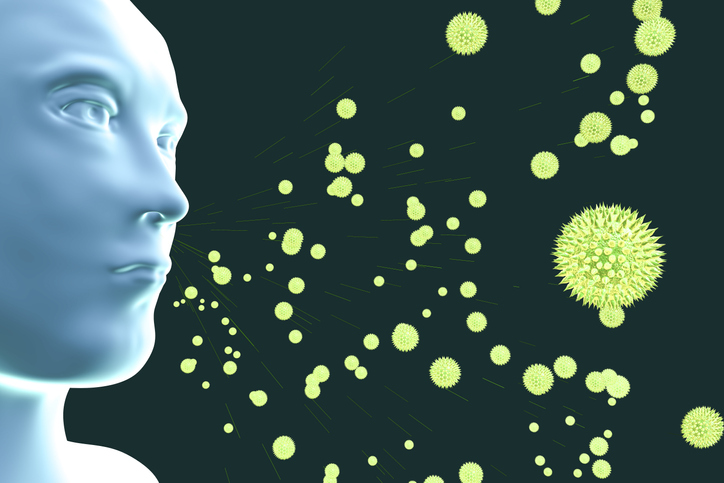Do You Smell That? If Not, You May Be Zinc Deficient Or Have COVID-19

Fever, dry cough and fatigue are some of the red flag symptoms of coronavirus. Basically, if you are experiencing these symptoms, you should assume you have COVID-19 and take the necessary precautions.
But another symptom many people are experiencing that is not as well recognized is a loss of smell (medically called anosmia, which is a total loss of smell. Hyposmia means partial loss).
Utah Jazz NBA player Rudy Gober, who is reportedly one of the first professional athletes in major American sports to contract COVID-19, shared that he lost his sense of smell.
“Just to give you guys an update, loss of smell and taste is definitely one of the symptoms, haven’t been able to smell anything for the last 4 days,” Gober tweeted.
“Anyone experiencing the same thing?”
Turns out, there are others experiencing a loss of smell.
Actor Aaron Tveit said that he is very lucky to have experienced milder coronavirus symptoms, however, “One thing I have been experiencing is the loss of taste and smell, which I think is a big sign for people who are otherwise [asymptomatic],” he said, in one report.

And in this CNN report, several people talk about losing their sense of smell due to COVID-19.
“A new study supports the notion that loss of either smell or taste may be an early warning sign of COVID-19,” according to Live Science.
“Anecdotal accounts of smell and taste loss associated with COVID-19 have been reported worldwide, but without formal studies, scientists could not determine how common the symptom was among those infected. Now, a new study published online April 12 in the journal International Forum of Allergy & Rhinology has found that smell and taste loss appear to be common initial symptoms in patients with mild infections.”
There are a few theories on this. I’m sure most of you have experienced having a cold or other upper respiratory infection that made you have a stuffy nose and difficulty smelling (and as a result, also difficulty tasting).
But there may be more to it. Some medical professionals believe that the coronavirus “...is using the olfactory nerve to transfer across the skull into the brain,” according to one report.
The olfactory nerve is essentially the “smell nerve.”
It is also possible that COVID-19 attacks sensory cells in the nose and causes inflammation of nasal tissues, which affects sense of smell.
“When the nerve is either surrounded by inflammatory molecules or has a lot of inflammation within the nerve cell body, it cannot function correctly -- and that is what causes the loss or dysfunction of smell. And it can happen to anyone: young and old, healthy and sick,” according to one Stanford doctor.
In most cases, the sense of smell returns. Everyone is different. It could take weeks for some and days for others. Some people may get all of their sense of smell back at once. For others, it may be more gradual.
Losing your smell can be frightening. When you lose a sense for what will hopefully only be temporarily, it can make you feel like you have lost it forever. We have five basic senses: sight, taste, touch, hear and smell.
Smell is one of those odd senses in the sense (pun intended) that if you smell something bad, you probably wish you couldn’t smell it at that moment. But if you smell something good (for example, fresh-baked chocolate chip cookies), it triggers your brain’s reward signals and makes you want to eat. Smell can even make certain memories and emotions come to surface.
For example, the smell of smoke may tell us there is a fire and we should leave where we are. The smell of spoiled food lets us know that food is not suitable for eating. As a result, we avoid getting sick from eating bad food. The smell of a strong chemical, for example when cleaning with household products, tells us to open a window and get some ventilation so that we are not just breathing in those harsh chemicals.
Some people who have lost their sense of smell due to COVID-19 have also shared that losing this sense made them feel depressed, because they could not really taste or enjoy food (smell and taste are connected).
One woman shared that losing her sense of smell triggered feelings from an eating disorder that she had overcome years ago. She figured that if she couldn’t really taste or smell food, then why even eat?
As mentioned, most people appear to be getting their sense of smell back, but it is important for us to recognize how precious this sense is to our health and wellbeing.
“As you get older, your sense of smell may fade. Your sense of smell is closely related to your sense of taste. When you can’t smell, food may taste bland. You may even lose interest in eating,” reports the National Institute on Aging.
This could be problematic, because if we don’t eat enough nutrient-rich foods we could suffer from nutritional deficiencies and unnecessary weight loss. In addition to this, if our smell and taste are impaired we may add too much salt and sugar to food and beverages to make up for the bland taste. This could increase the risk of health issues such as hypertension and diabetes.
Be proactive with zinc.
Zinc is a nutrient which is required for proper sense of taste and smell. According to the National Institutes of Health’s Office of Dietary Supplements, a “daily intake of zinc is required to maintain a steady state because the body has no specialized zinc storage system.”
"According to the National Health and Nutrition Examination Survey III, 35% to 45% of adults 60 years of age or older had zinc intakes below the estimated average requirement of 6.8 mg/day for elderly females and 9.4 mg/day for elderly males. Zinc deficiency may lead to loss of appetite, impaired immune function, weight loss, delayed healing of wounds, eye and skin lesions, and smell and taste disturbances. Older adults are especially affected by changes in taste sensations because of age-related gustatory dysfunction, use of multiple medications, increased frailty, and zinc deficiency," states the National Institute of Health.
Whatever your age, young or old, it’s important to make sure that you are nutritionally balanced by taking routine nutrient tests which include zinc.
If the test reveals you have too much or too little of a certain vitamin or mineral such as zinc, a competent healthcare professional can work with you on making the necessary dietary changes and recommend quality supplements if necessary.
For foods rich in zinc, check out this pH Labs blog. This mineral is also known for keeping the immune system strong, a key factor in helping win the battle against COVID-19.
For additional tips on how you can stay healthy during the coronavirus pandemic, read here.
Enjoy your healthy life!
The pH professional health care team includes recognized experts from a variety of health care and related disciplines, including physicians, attorneys, nutritionists, nurses and certified fitness instructors. This team also includes the members of the pH Medical Advisory Board, which constantly monitors all pH programs, products and services. To learn more about the pH Medical Advisory Board, click here.







